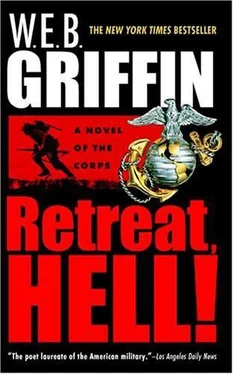"Get the hospital commander on the phone, Lieutenant," the man said. "Tell him Senator Fowler is in his emergency room."
Oh, Jesus. That's who it is! Richardson K. Fowler in the goddamn flesh! I knew I knew that face!
"Senator, will you come with me, please? We'll see if we can get the hospital commander on the phone for you."
"Thank you very much," Senator Fowler said.
"Senator," Captain W. Ainsley Unger, Jr., MC, USN, said five minutes later, "there's obviously been a communications foul-up somewhere. If I had known you were coming . . ."
"Captain—or do I call you 'Doctor'?"
"Either's fine, Senator."
"This is Mrs. Patricia—Mrs. Fleming—Pickering. Her son, Major Malcolm S. Pickering, Marine Reserves, was flown in here last night from Japan. We want to see him."
"Well, Senator, visiting hours—"
"Are over. The young doctor made that clear. Let me put it this way: Mrs. Pickering is determined to see her son, who spent most of the last three months evading capture in Korea, and I am determined that she shall. Now, can you arrange this for us, or should I get on the telephone to the Secretary of the Navy?"
"I'm sure an exception can be made," Captain Unger said. "Do you happen to know where in the hospital your son is, Mrs. Pickering?"
"Room 16," Patricia Fleming said, "NP Ward."
The effect of that announcement was evident on Dr. Unger's face.
"I suspect NP stands for Neuro-Psychiatric," Patricia Fleming said. "Does it?"
"Yes, ma'am, it does. And that may complicate things, as you can well understand."
"I want to see my son," Patricia Fleming said flatly.
"May I make a suggestion, Mrs. Pickering?" Dr. Unger said.
"Of course."
"I think it would be best if you had a word with his attending physician before you see him."
"That makes sense, Patty," Senator Fowler said.
"Okay," Patricia Fleming said, "as long as I have the word with him now, tonight."
"Yes, of course," Dr. Unger said.
Lieutenant Patrick McGrory, MC, USN, looked a little flushed when he came into Captain Unger's office. Senator Fowler wondered if he was flushed because he had run or trotted in response to the captain's call, or whether, perhaps, the young Navy doctor had had a belt or two.
Dr. McGrory immediately put the question to rest.
"I was in the Officers' Club, sir," he said to Captain Unger. "I didn't expect to be called upon to discuss Major Pickering tonight."
"You're not drunk, certainly." j
"Well, I wouldn't want to drive, sir, but I'm not drunk."
"Doctor, you probably recognize Senator Fowler," Captain Unger said.
"Yes, sir, indeed I do," McGrory said with a smile, putting out his hand. "I even voted for you, Senator, thereby enraging my staunchly Democrat family."
Fowler beamed.
"How do you do, Doctor?" Fowler said. "I have myself been known to take a little nip at the end of a hard day."
"You've a connection with Major Pickering, Senator?"
"I'm his godfather," Fowler said. "And this is his mother, Mrs. Patricia Pickering, who has herself been known to take a little nip after duty hours." He paused and looked at Captain Unger. "I mention that, Captain, to make the point that neither Mrs. Pickering nor I are in any way offended because Dr. McGrory has had a drink or two."
"I'm glad you understand," Unger said. "And I know how hard Dr. McGrory works."
"Let's talk about my son," Patricia Pickering said.
"Okay," McGrory said. "He's a hard-nose. I'm pleased to see that it's probably genetic, rather than a symptom of his condition."
"I would suggest, Doctor, that the trait may be genetically inherited from both parents," Fowler offered. "Has he spoken of his father?"
"No. Right now, he's not talking to me at all."
"What, exactly, is wrong with him?" Patricia Fleming demanded.
"Physically, he's thirty, forty, maybe more pounds underweight. He apparently didn't get much to eat while he was evading capture. His teeth are a little loose in his gums, but a dental surgeon assures me that the situation will clear itself up as we fatten him up. He looks like a scarecrow; be prepared for that when you see him."
"He's in the Neuro-Psychiatric Ward," Patricia Fleming stated, making it a question. As McGrory framed his response, she impatiently demanded, "Why?"
"Well, despite what healthy, hearty, courageous young men like your son like to think, Mrs. Pickering, experience has shown that no one goes through what your son has gone through without some psychological effect."
"And in his case, what is that effect?" she snapped.
"Just so we understand one another, Mrs. Pickering," McGrory said, "I'm on your son's side. I'm going to help him. I'm one of the good guys."
"I'm sorry," she said.
"Okay. Right now he's acting like a perfectly normal young man. That doesn't mean he is perfectly normal. And I won't be able to judge what damage he's suffered, or begin to deal with it, until he tells me what he went through, and he's told me that's none of my business."
"There's something I think I should tell you, Doctor," Fowler said. "For the first time in his life, I think, he was in love. I mean, his father tells me that he was in love."
"You mentioned his father before," McGrory said. "Is there something you think I should know about him, about Major Pickering's relationship with his father? Have there been problems there?"
"They're two peas from the same pod," Patricia Fleming said. "They are so alike, it's frightening."
"His father is Brigadier General Pickering, US Marine Corps," Fowler said. "The Deputy Director of the CIA for Asia."
"He didn't get into that at all, and I certainly would have remembered that," McGrory said. "What about this love affair? Did that give him problems?"
"The day before Pick was rescued," Fowler said, "his girlfriend—she was more to him than 'girlfriend' implies—who was a war correspondent . . . Jeanette Priestly, of the Chicago Tribunet . . ."
McGrory nodded, indicating that he knew who she was.
". . . was on an Air Force medical supply airplane. Trying to get into Wonsan, North Korea, it crashed, exploded, and burned. There were no survivors."
"Oh, the poor bastard!" McGrory said, and sighed audibly. And then, having heard himself, he quickly added: "I beg your pardon, Mrs. Pickering."
"Doctor, the way you said that proved to me that you meant what you said about being on Pick's side. You are one of the good guys, and I apologize for my rudeness to you before."
"Okay," McGrory said after a moment. "We're friends. That will help a good deal."
"May I ask what happens now?" Patricia asked.
"Well—don't misunderstand this; I'm grateful to hear about anything that's given him a problem—we first have to get him to talk about what he went through, and then about the girl." He paused, visibly in thought, and then went on. "Just before I was summoned here from the club, with three, four drinks in me, I had just about decided that the standard technique for dealing with patients who won't talk probably won't work with Major Pickering."
"I don't understand," Patricia said.
"The carrot and the stick," McGrory said. "If they're cooperative, they get to go to the club, even on passes—short, four- or six-hour passes, with a responsible person—and if they don't, we keep them in the ward in their bathrobes and slippers." '
"I see," she said. "He's not going to like that. But it's also likely to get his back up, and—"
"The thought occurred to me," McGrory interrupted her, "that if he could evade capture for as long as he did, escaping from the ward would be child's play for him. We'd catch him, eventually, of course, but that would only serve to increase his resentment. And what we're trying to do is help him, not make him obey the rules. Let me think about that some more. If he understands that he's not going back to duty until I say so, then maybe he will start talking to me. Maybe a couple of stiff belts every afternoon at seventeen hundred is medically indicated."
Читать дальше












